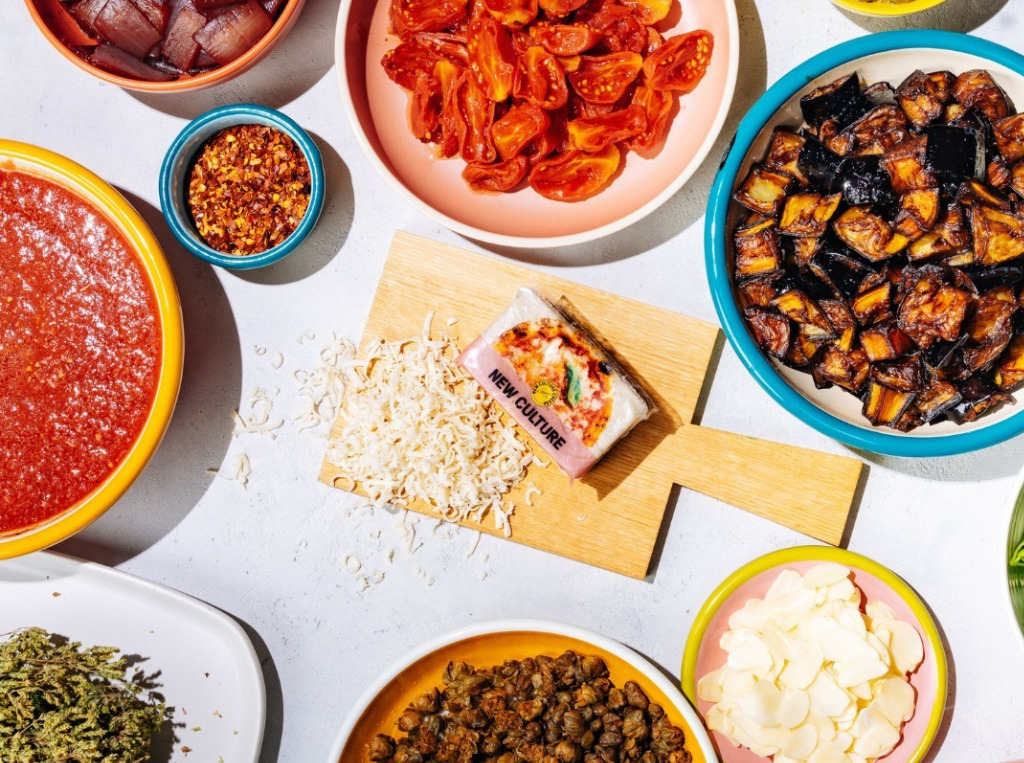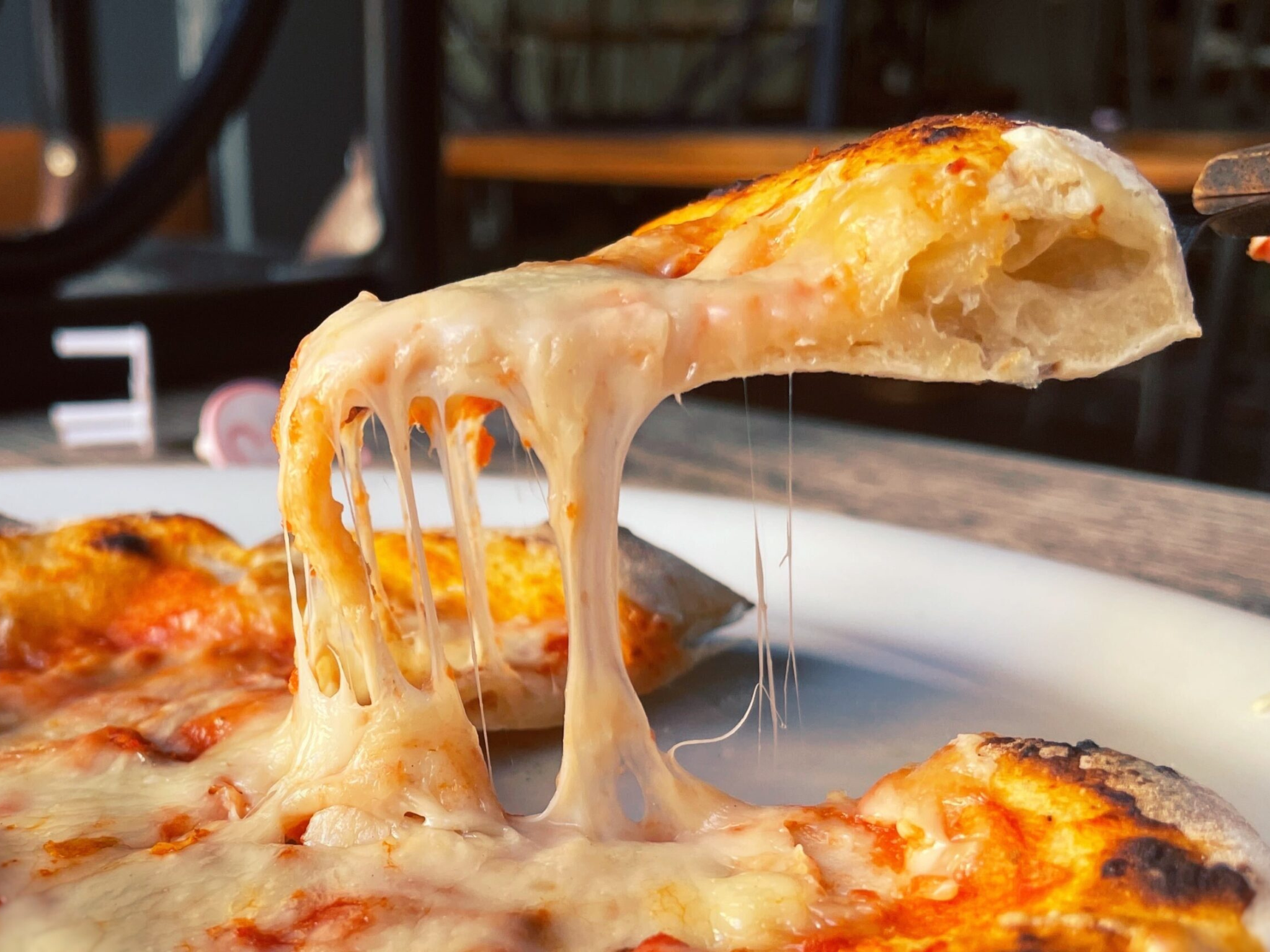Latest Breakthrough Brings Animal-Free Mozzarella Maker Closer to Price Parity with Dairy
5 Mins Read
New Culture now needs much less animal-free casein to produce its mozzarella compared to conventional cheese, a critical step in its path to match the price of dairy.
Californian startup New Culture has achieved a significant cost breakthrough in its process to create melty, stretchy mozzarella without the cow.
The animal-free dairy company uses precision fermentation – which combines traditional fermentation with the latest biotech advances to efficiently produce a compound of interest – to make casein, the main protein found in milk, from microbes.
Its first product – a fermentation-derived mozzarella – combines the protein with water, plant-based fats, and minerals, and has dropped below a key cost threshold.
New Culture’s cow-free cheese now needs just 28% of casein, less than half as much as conventional mozzarella. Since its casein makes up the majority of its mozzarella’s cost, the low inclusion rate allows it to lower the markup considerably, and demonstrates the “superior functional properties” of its protein, the company says.
“When we started making animal-free cheese, we used the ingredient profile of conventional mozzarella as our recipe benchmark. Over time we developed a deep biochemistry understanding of our casein including the interactions of our casein and how to activate it. Based on these findings, we were able to drop the casein inclusion rate without taking a hit on product quality,” co-founder and CEO Matt Gibson tells Green Queen.
“What we didn’t do is load up on sticky, slippery starches or fillers that are common in plant-based cheeses. Instead, we’ve taken a holistic approach based on fundamental food science and the essential components that make up conventional mozzarella.”
Last year, New Culture suggested that it would be able to reach price parity with conventional cheese within three years, a timeline Gibson confirmed earlier this year. A survey conducted by the startup in January revealed that 80% of people are interested in buying its animal-free cheese, with early adopters happy to pay $4 more per pizza with the company’s cheese.
While he wouldn’t be drawn on the current price difference between New Culture’s and dairy mozzarella, he tells Green Queen: “This new inclusion rate further proves New Culture’s financial viability. With this reduction, we’ve hit an essential milestone on our path to achieving cost parity with conventional mozzarella and reaching positive net margins.”
Animal-free mozzarella outperforms dairy on top attributes

Casein makes up 80% of the protein content found in bovine milk, and it’s what makes cheeses like mozzarella melt, stretch, bubble and brown. It does so by emulsifying fats and water, and it’s an ingredient commanding a $2.7B market.
But dairy is not an environmentally friendly food group, prompting many startups to work on animal-free versions using precision fermentation. While New Culture hasn’t conducted its own life-cycle assessment, analysis of publicly available data for comparable processes has led it to estimate that its animal-free mozzarella reduces emissions by 80%, land use by 95%, and water consumption by 95%.
The startup says it has combined sensory evaluations with analytical techniques to characterise mozzarella’s top 15 attributes, and assessed the priority properties for different applications, like pizzas or salads.
“The 15 attributes that we assess – through a variety of sensory approaches – span both cooked and raw cheese, and include flavour, melt, stretch, and other, more subtle properties that collectively give an authentic mozzarella experience,” explains Gibson.
“As we tried reducing the inclusion rate, it was imperative that each of the 15 attributes received a passing score. For instance, even if a formulation had great stretch and a bouncy bite, it wouldn’t pass if it left a sticky residue on a taster’s teeth or had a dry surface.
“In addition, attributes can be in tension with one another. Better bite resistance can mean worse melt. Better oiling off might mean a worse mouthfeel. So we had to find the space in between that satisfied all attributes of a delicious mozzarella.
“Ultimately, what enables us to make such a high-quality product is a detailed scientific understanding of what makes great mozzarella as well as a detailed biochemical understanding of how our casein plays a role in delivering on that experience.”
New Culture fundraising ahead of restaurant debut

New Culture’s latest cost milestone comes months after it partnered with Korean food giant CJ CheilJedang to enable low-cost manufacturing, following a link-up with ADM to expand production two years ago. The firm has previously highlighted its capacity to produce enough mozzarella for 25,000 pizzas per batch, but scaling up further can help bring manufacturing expenses down by 80%.
“We’ve been extremely intentional about building strategic partnerships with two of the largest precision fermentation companies on the planet: ADM and CJ,” says Gibson. He explains that New Culture’s focus with these collaborations is on casein production – its cheese product development is all done in-house.
“Our partnerships with companies like ADM and CJ enable us to move faster in reaching the manufacturing scale necessary to achieve our mission,” he adds.
Having secured $25M in an oversubscribed Series A funding round three years ago, Gibson reveals that the startup is now fundraising again. And earlier this year, it became the first producer to obtain self-affirmed GRAS (Generally Recognized as Safe) status for precision-fermented casein, allowing it to sell the protein in the US.
New Culture unveiled its precision-fermented mozzarella for a tasting at Nancy Silverton’s Pizzeria Mozza in Los Angeles last year, and will make its full market debut with the same eatery soon.
The startup had previously anticipated a launch by the end of this year. “Launching not only a new product, but an entirely new product category, isn’t a straight line. A few factors have been tough to anticipate, including securing certain permits as a non-conventional dairy company,” says Gibson.
“We can’t wait for our cheese to be on the menu at Nancy Silverton’s Pizzeria Mozza in LA,” he adds. “We hear truly every single day from consumers eager to try our cheese and we’re working as fast as we can to get it to them.”
New Culture is joined by startups like Change Foods, Fermify, Zero Cow Factory, and Standing Ovation working on precision-fermented casein too. California’s Nobell Foods and Israel’s Finally Foods are using molecular farming to produce the protein, while New York-based Pureture and San Francisco startup Climax Foods are making vegan casein.



